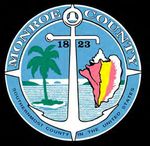Educating with Extension - Monroe County
←
→
Page content transcription
If your browser does not render page correctly, please read the page content below
Educating with Extension
University of Florida, Institute of Food and Agricultural Sciences (IFAS), Monroe County
Volume 18 Issue 2 February 2019
By Liz Yongue, Extension Coordinator, and in collaboration with Alicia Betancourt, Shelly Krueger and Michelle Leonard-Mularz,
of University of Florida’s IFAS Extension Program
Florida Keys Shallow Water Sponges
By Shelly Krueger, Florida Sea Grant
Sponges are the oldest animals on
Earth. Sponges are very important for water
quality because they eat viruses, bacteria, and
phytoplankton. The average basketball-sized
sponge can filter 425 gallons of water per
day. Yet very little is known about sponges in
general. Many sponge species in the nearshore
waters are commonly misidentified and many
have not been given common or scientific
names at all. Even the role of sponges for
improving water quality and nutrient cycling is
poorly understood. Sponges are ecologically,
commercially, and culturally important in the
Florida Keys. For more than 150 years there
has been a commercial sponge fishery in Florida. At the Sponges being auctioned off from the wharf in Key West.
Image courtesy of NOAA
turn of the 19th century, sponges collected from the Florida
Keys were a major commercial commodity, with export
values from Key West second only to hand-rolled Unfortunately, sponge communities in nearshore waters
cigars. Shallow-water sponge species have been in decline continue to decline. Beginning in the early 1990s, a series
since at least 1939, when a sponge disease of unknown of harmful algae blooms caused massive sponge die-offs in
etiology caused wide-spread die-offs and virtually Florida Bay. In 2017, Hurricane Irma caused massive
collapsed the South Florida sponging industry. After numbers of sponges to wash ashore from wave action and
WWII, synthetic sponges were invented, and demand for from the reverse storm surge that killed many sponges due
natural sponges declined. Today, sponging in Florida is an to prolonged air exposure. Restoring sponges is very
artisanal fishery with a cultural legacy. important because they filter the water and offer a place to
hide for spiny lobster and many other fish and
invertebrates. There are not many animals that eat sponges
except for hawksbill turtles, angelfish, trunkfish, cowfish
and butterfly fish.
Currently, the Monroe County Extension Service is
creating a Sponge Gardening program. Sponge Gardening
is a citizen science project that will use volunteers to grow
sponges hanging in residential canals. Citizen scientists
will be recruited first from the list of Florida Keys Water
Watch volunteers (FKWW) who have collected 2+ years
of water quality data from their backyard
canals. Volunteers will be taught how to perform routine
maintenance and will assist to measure sponge growth,
morbidity and mortality.
A diver places sponges in a sponge garden in the Florida Keys.
To learn more about this program, please contact
Image courtesy of Jennifer Stein, The Nature Conservancy Shelly Krueger at shellykrueger@ufl.edu or (305) 292-4501!V O LU M E 1 8 ISSU E 2 ED UC AT I NG W I TH E XT E N SI O N PAGE 2
Horticulture News Plant Sea Grant News
Michelle Leonard-Mularz
Clinics Shelly Krueger
Michelle recently accomplished the The Monroe County Master Gardeners Shelly recently accomplished the
following activities: will help you with plant problems or following activities:
insect identification at the following
Michelle and Master Gardeners locations throughout the winter: Shelly represented Florida Sea Grant
conducted 19 site visits throughout at the Southeast Disaster Recovery
the Keys in January to help resolve Partnership meeting in Savannah,
landscape issues and offer sustainable Georgia and presented to 55 people in
gardening advise. Many times the planning and recovery sectors about
problem stems from improper the NOAA-funded spiny lobster rapid
planting and/or root defects that response to identify displaced traps
weren’t addressed prior to planting following Hurricane Irma. This is a
in the landscape, causing the tree or KEY WEST continuation of the workshops held in
shrub additional stress. Follow these Gato Building / Extension Office November in Key West regarding
steps to minimize problems later on 1100 Simonton Street, #2-260 disaster recovery for fisheries and
https://edis.ifas.ufl.edu/pdffiles/EP/ 9:00 a.m. to 12 noon maritime industries.
EP39000.pdf
February 4th* Shelly taught Florida Keys Water
March 4th and 18th Watch workshops to the Florida Keys
April 1st and 15th Community College Marine Data
Collection course for the 6th time.
FKCC uses FKWW to teach students
~~~~~~~~~~~~~~~~~~~~~ about scientific data
collection. Shelly
MARATHON also taught 6 home-
Marathon Home Depot owners at
4555 Overseas Highway Breezeswept Beach
9:00 a.m. to 12 noon Estates on Ramrod Key.
Mango tree with 4” of excess soil and February 16th Shelly is writing the sponge module
mulch on top of the rootball causing overall for the new Florida Master Naturalist
decline and dieback in the canopy. March 16th
special topic on Coastal Restoration
April 20th
and a Journal of Extension article on
UF/IFAS Monroe County Extension the response to assist the spiny lobster
Service and the Master Gardeners ~~~~~~~~~~~~~~~~~~~~~ fishery in Monroe County following
participated in 3 community events in Hurricane Irma.
January (Key West Artisan Market,
KEY LARGO
Murray E. Nelson Government & Shelly is on the management team and
John Pennekamp State Park Native
Cultural Center / Extension Office citizen engagement team for the Stony
Plant Day, and Marathon Garden Coral Tissue Loss Disease outbreak in
102050 Overseas Hwy., #244
Club January Jamboree). the Florida Reef Tract and contributes
9:00 a.m. to 12 noon
to weekly conference calls with the
Look for our booth at GardenFest multiagency committees.
February 6th and 20th
Key West at the Key West Tropical
March 6th and 20th Shelly participated in The Nature
Forest & Botanical Garden on
April 3rd and 17th Conservancy presentation on nature
February 16th & 17th!
based solutions for shoreline
hardening, assisted with the
2019 Master Gardener Course begins
community resilience planning
February 15, 2019. This year we have
workshop with Thomas Rupert, and
21 participants taking the course from *Extension Offices will be closed the FWC Red Snapper workshop at
Key Largo to Key West! February 18th for Presidents’ Day! the Harvey Government Center.
Be sure to “Like” us on Facebook and follow us on Twitter and Instagram!V O LU M E 1 8 ISSU E 2 ED UC AT I NG W I TH E XT E N SI O N PAGE 3
Family and Community
Development News February Happenings
Alicia Betancourt
Alicia recently accomplished the
Save-The-Date
following activities: Valentine’s Day
Thursday, February 14th
Alicia worked to develop Extension
~~~~~~~~~~~~~~~~~~~
priorities within the 2020 Monroe
County Strategic Plan including
initiatives related to economic
development, water quality and
landscaping best practices for
coastal environments. Key West Botanical Garden EmpowerU! Advocating for
Speaker Series Natural Resources is a NEW
Alicia worked as the Co-Chair of the Saturday, February 16th training program designed for anyone
National Network for Sustainable 1:30 p.m. to 2:30 p.m. interested in natural resources to
Living Education to organize 5210 College Road, Stock Island grow their skills and meaningfully
priorities for 2019-2020 including Guest Speaker: Marjorie Townsend
member projects such as updating
engage decision-makers about issues
of Townsend Family Organic Farms, they are concerned about!
the Sustainable Living Handbook.
on “Hydro-Culture and Organic
Gardening in the Keys” This training program includes:
Alicia spoke on the radio about (8 hours online and 1-day in-person)
greenhouse gas emissions (GHG).
After years of decline the preliminary GardenFest at the Key West
Botanical Garden Online activities: March 3rd - March
GHG emissions for the U.S. is
estimated to be a 3.4% increase in 5210 College Road, Stock Island 29th (2 hours per week; at your own
2018. This is only the second time in Saturday, February 16th and pace.
two decades that the emissions have Sunday, February 17th In-person workshop (8 hours; 8am –
increased. The last time was in 2010 10 a.m. to 3 p.m.
as a correction to the dramatic 5pm); choose either:
~~~~~~~~~~~~~~~~~~~
decrease of the 08-09 recessions. -Ocala on Thursday, April 4th or
Over the last decade a brood switch
in power generation form coal to -Gainesville on Saturday, April 6th
natural gas has accounted for
decreases but the demand for energy Registration:
and an increase in large scale trans- Presidents’ Day $25; includes lunch and refreshments
portation have created a significant during in-person workshop
Monday, February 18th
increase in national emissions.
Nationally we are at 11.2% reduction
Monroe County offices will be closed
~~~~~~~~~~~~~~~~~~~ Capacity is limited to 24 participants
from 2005. Local and regional
emissions are have achieved a de- per workshop
crease of 10% from 2005-2015. Registration will close Feb 22nd, or
Given Florida’s significant vulnera-
bilities to climate change and that it
when capacity is reached.
is also the fourth largest emitting For more information and RSVP:
state in the country; the state must
lead by example in reducing emis- Monroe County Climate Change Ocala, April 4th:
sions. While local governments in Advisory Committee Meeting https://empoweru-
Southeast Florida continue to ad- Tuesday, February 19th ocala.eventbrite.com
vance efforts to increase energy effi- 12:30 - 4:00 p.m. Gainesville, April 6th:
ciency and reduce energy use, state Marathon Government Center https://empoweru-
policy and initiatives are integral to 2798 Overseas Highway, Marathon gainesville.eventbrite.com
regional emission reduction goals.
Be sure to “Like” us on Facebook and follow us on Twitter and Instagram!V O LU M E 1 8 ISSU E 2 PAGE 4
UF/IFAS/MONROE COUNTY EXTENSION
1100 Simonton Street, Suite 2-260, Key West, FL 33040
102050 Overseas Hwy., Suite 244, Key Largo, FL 33037
KW Phone: 305-292-4501 KL Phone: 305-453-8747
KW Fax: 305-292-4415 KL Fax: 305-453-8749
General e-mail: monroe@ifas.ufl.edu
Newsletter Editor: Liz Yongue, Extension Coordinator
This newsletter can be accessed online at:
http://www.monroecounty-fl.gov/773/Educating-with-
Extension-Newsletters
County Extension Director: Alicia Betancourt
Please recycle this newsletter!
We’re on the Web at http://monroe.ifas.ufl.edu
Facebook Twitter Instagram In this issue of Educating with Extension:
- Florida Keys Shallow Water Sponges
University of Florida (UF)
- Family and Community Development News from
http://SolutionsForYourLife.ufl.edu
Alicia Betancourt, our Extension Director
http://ufl.edu - Sea Grant News from Shelly Krueger
Electronic Data Information Source (EDIS)
- Horticulture News from Michelle Leonard-Mularz
http://edis.ifas.ufl.edu
- Upcoming Plant Clinic Dates
- February Happenings
- Save-The-Date: Empower U Training
UF/IFAS Extension is - Tax ID Theft Awareness Week
Putting Florida First
It’s Tax ID Theft Awareness Week! For more information about what Extension
Tax ID theft occurs when someone files a tax return is doing in the Keys, please visit our websites!
on someone else’s social security number. The theft is Be sure to check out our calendars and blog pages, too!
often discovered when the victim goes to file their
own tax return and the IRS rejects it as a duplicate
return. Monroe County Extension Website: http://www.monroecounty-
fl.gov/131/Extension-Services
Here are a few tips from UF/IFAS Finance Expert
Dr. Jorge Ruiz-Menjivar on avoiding Tax ID Theft! University of Florida, Institute of Food and Agricultural Sciences
(IFAS) Extension Website: http://sfyl.ifas.ufl.edu/monroe/
The best precaution is to have your documents
ready, and file early!
File electronically (either yourself or through
UF/IFAS/MCES QUARTERLY CONTACTS
e-filing software)
Set-up your return as a direct deposit into your Nov Dec Jan Totals
bank account.
Phone calls 72 51 80 203
Free Tax help is also offered in Monroe County
through the United Way of the Florida Keys! Just go Office visitors 19 8 10 37
to KeysUnitedWay.org/vita2019 to see if you qualify Visits to clients 12 9 23 44
or make an appointment!
Learning events 33 28 47 108
An Equal Opportunity Institution. UF/IFAS Extension, Participants 398 312 583 1,293
University of Florida, Institute of Food and Agricultural Media submissions 5 3 28 36
Sciences, Nick T. Place, dean for UF/IFAS Extension. Single
copies of UF/IFAS Extension publications (excluding 4-H and Publications distributed 543 146 452 1,141
youth publications) are available free to Florida residents
from county UF/IFAS Extension offices. TOTAL contacts 1,082 557 1,223 2,862You can also read



























































